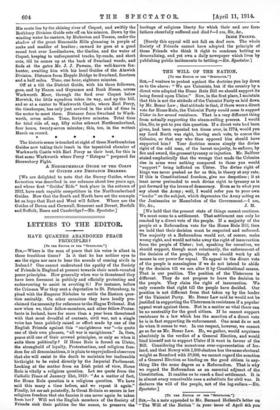THE WILL OF THE NATION.
[To rum Ennor or ins "Sprortroa73
SIR,—I venture to protest against the doctrine you lay down as to the above: "We are Unionists, but if the country by a direct vote adopted the Home Rule Bill we should support its being forced upon Ulster." Now, in the first place,' maintain that this is not the attitude of the Unionist Party as laid down by Mr. Boner Law ; that attitude is that, if there were a direct vote for Home Rule, the Unionist Party would cease to support Ulster in her armed resistance. That is a very different thing from actually supporting the steam-rolling process. I would like, Sir, to put to you this question. If a direct vote had been given, had been repeated ten times over, in 1774, would you Bay Lord North was right, having such vote, to coerce the Colonies, or that any who then opposed him should have supported him ? Your doctrine means simply the divine right of the odd man, of the barest majority, to enforce, by fire and sword, the grossest tyranny or injustice. Mr. Balfour' stated emphatically that the wrongs that made the Colonies rise in arms were nothing compared to those you would "support" being inflicted on Ulster. The divine right of kings was never pushed as far as this, in theory at any rate. If this is Constitutional freedom, give me despotism ; it at least never pretended to such divine right to tyranny as is put forward by the lovers of democracy. Even as to what you say about the Army ; well, I would refer you to your own "leader" on the subject, which deprecates the Army acting as the Janissaries or Kamelukes of the Government.—I am, Sir, Ste., J. M.
[We hold that the present state of things cannot continue. We must come to a settlement. That settlement can only be reached by a direct vote of the people. If a majority of the people at a Referendum vote for the Home Rule Bill, then we hold that their decision must be respected and enforced. The majority at a Referendum would not, of course, make wrong right, and would not take away the right of insurrection from the people of Ulster; but, speaking for ourselves, we should support, though most reluctantly, the enforcement of the decision of the people, though we should work by all means in our power for repeal. To appeal to the direct vote of the people is meaningless if we do not intend to abide by the decision till we can alter it by Constitutional means. That is our position. The position of the Ulstermen is different. They do not propose to leave the decision to the people. They claim the right of insurrection- We only concede that right till the people have decided. Our position is not different from that taken up by the leader of the Unionist Party. Mr. Boner Law said he would not be justified in supporting the Ulstermen in resistance if a popular appeal went against them. But in a matter so vital there can be no neutrality for the good citizen. If he cannot support resistance to a law which has the sanction of a direct vote he is in fact supporting its enforcement. One must do or not do when it comes to war. Its one respect, however, we cannot go so far as Mr. Boner Law. He, we gather, would acquiesce absolutely in the verdict of a General 'Election, and would bind himself not to support Ulster if it went in favour of the Bill. Considering the monstrous over-representation of Ire- land, and that Newry with 1,800 electors has the same electoral weight as Rumford with 59,000, we cannot regard the sanction of a General Election as binding on the good citizen in any- thing like the same degree as a Referendum. That is why we regard the Referendum as an essential adjunct of the Constitution. It enables us to reach a final settlement. It is in almost every conceivable case a substitute for civil war. It declares the will of the people, not of the log-rollers.—En. Spectator.]






































 Previous page
Previous page